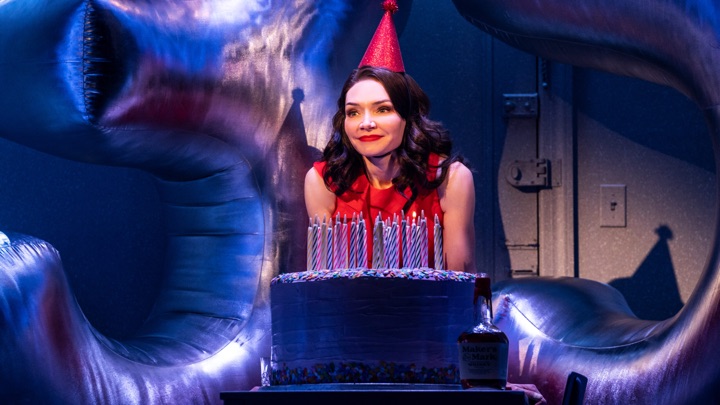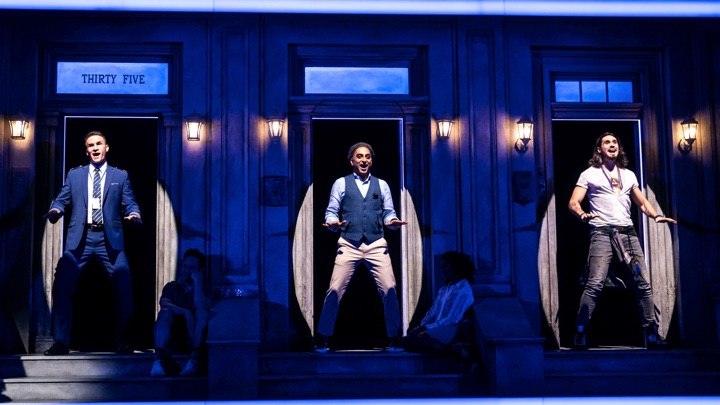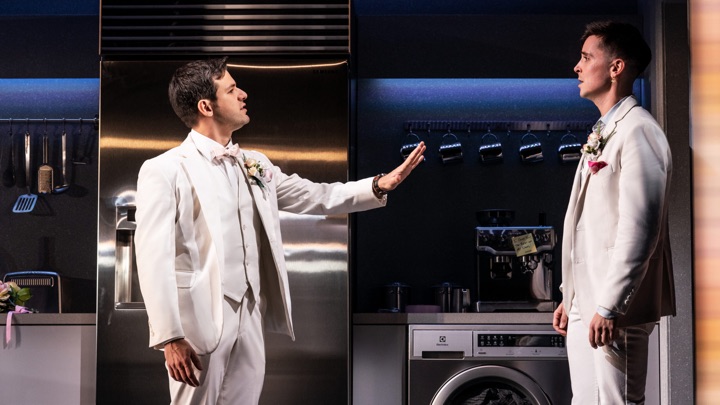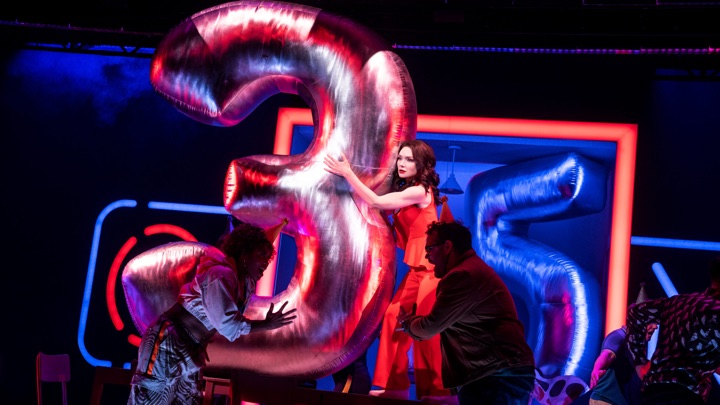
DAVID FOX: So let’s take this on at the start. Nagarajan gave a fine if not star-making performance: confident, with a personal take on the role and a good singing voice (especially pungent in the lower register) that put a notable stamp on “The Ladies Who Lunch.” Under what must have been very difficult circumstances, she acquitted herself more than honorably. I also think there’s a gain to the structure of the show itself in treating Joanne as a true ensemble member rather than cameo star part—which is part of the reason I declined the option to reschedule (which, for the record, Telecharge offered and made fairly easy).
CK: The question of whether or not to review a production without its full cast is a legitimate one, but I see no reason not to expound upon an experience we paid for (also for the record, a request we made for press tickets in the pre-COVID preview period was turned down.) This is, after all, one of the most hotly anticipated shows of the season… and we certainly have opinions. So other than all that, Mrs. Lincoln, how was the play?
DF: It pains me to say this, but for the most part I think it’s ghastly. Before explaining why, though: I want to be very clear that it’s largely not because of the substantial and much-discussed revision of the show (with Sondheim’s approval, and at least mostly done by him) that reassigns the gender of a number of the roles, notably Bobby—now “Bobbie”—who here is female. There’s a lot to be said about that, and we’ll go into it. But for now, I’ll simply say that some of it is less jarring or even noticeable than I imagined; and some of it is effective and interesting. In the end, for me it’s a it’s an provocative idea that ultimately doesn’t fit, but I’m glad to have had the chance to consider it, in part because thinking about the reasons why I’m not convinced made think about the original show—which I’ve seen a number of times, including in the original tour—more deeply.
CK: The choice to reimagine Bobbie struck me as less woebegone than the decision by Sondheim and director Marianne Elliott to wrest the material from its original 1970 setting and place it in the present day. Answering services are replaced by ever-present smartphones, and references to the Seagrams Building and Life Magazine are jettisoned in favor of more current analogs. (“Keeping house but clutching a copy of Time” is an undeniably bad update, though, as it doesn’t come close to capturing the cultural significance of Life in that period.) The effect is a creative team twisting itself in knots to take a show that was written to reflect its moment—and which became a legitimate period piece even before “the decade ahead” was dispatched—and make it feel equally relevant from a contemporary point of view. But it just doesn’t work, because the personal and cultural antecedents don’t align. Company only makes sense as a snapshot of its moment, full stop. Thanks for coming to my TED Talk.
DF: I agree wholeheartedly about the time-shifting… and I’m not exempting Sondheim from some of the problems here. But really, for me you’ve sort of buried the lede: I lay most of the blame squarely on Elliott’s schticky, over-busy, utterly tone-deaf direction. When I think back on this show, what I’m going to remember far more than the characters and the story is the several tons of ugly scenery (by Bunny Christie, who also designed the somewhat less ugly costumes) being pushed around (not entirely successfully, by the way—there was a halt of several minutes near the beginning of a performance that was only days before official opening), and a surfeit of ideas, most of which were dumb on their own, and collectively made even less sense. There is no internal logic to this production. One minute it’s Alice in Wonderland; another, someone’s popping out of a refrigerator… just writing this, I shudder from Critic’s PTSD.
CK: Elliott is not a director. She’s an installationist. This was evidenced in her stagings of War Horse (a play about a puppet) and The Curious Incident of the Dog in the Night-Time, from which I mostly remember people being carried around the stage. (She won Best Director Tonys for both, which leads me to believe American Theatre Wing voters have no idea what a director actually does.) Even her interpretation of Angels in America favored pageantry over distinct characterization and interpersonal relationships, leaving the actors to give wildly divergent performances that seemed to place them in different productions.
DF: Your mention of Elliott’s Angels, which I saw via NT Live, reminds me of a problem in that production that is also on view here: the lack of specificity in setting. If Company is squarely set circa 1970—which I agree is the case—it’s also deeply about New York. Boris Aronson‘s original set distilled that brilliantly, and every production I’ve seen since has at least gestured at it. Until now: this Company could take place virtually anywhere.
CK: Even more so than Angels, Company is a musical that lives and dies on the believability of the bonds between its characters. It is all about how these people embrace and recoil from each other, how they guard themselves and when they choose to be vulnerable, and how the ecosystem of friendship is constantly changing, for better or worse. You get literally none of that here, and I remain unconvinced that Elliott even has the skill to understand that, much less communicate it.
DF: George Furth’s book for Company reminds me a lot of Neil Simon in good and bad ways. It’s sometimes superficial and occasionally goes for easy laughs; but it’s also highly actable, and at its best, it has both insight and sting. The first extended scene, for example, is filled with tiny conversational daggers that far outweigh the physical comedy—and lead superbly into “Sorry-Grateful.” Not here, though. Instead, it’s crudely played like a Saturday Night Live sketch. There’s no gentle way to say this—the acting in Elliott’s Company often looks amateurish. Jennifer Simard and Christopher Fitzgerald are particularly egregious in terms of mugging, but really no performer emerges from the Elliott train wreck unscathed. Related to the cranked-up sketch acting—and to my mind, equally damaging—is song lyric delivery that over-points individual lines, as though not trusting the audience to “get it.” I cringe at remembering Fitzgerald pouncing on “You don’t live FOR her / You do live WITH her.” One example among many.
CK: Indeed. I felt sorry for Nikki Renée Daniels, who as Jenny also takes on the soprano soloist duties in “Getting Married Today”—she has a lovely clarion voice, but she was also saddled with schtick, as this non-character was conceived as a sort of demonic priest with a white shock wig and rainbow socks. That she emerged with any dignity intact is admirable. (Daniels’ Jenny is also the only character whose costume appears to be stuck in the ‘70s.) This brings us to another point: the pivotal marriage scene that closes Act One has been re-envisioned as a gay wedding, with the spiraling Amy now Jamie. Matt Doyle’s delivery of that famously difficult song seemed more an endurance test than a triumph of dexterity, but that’s not the issue that bothers me most. The scene that follows—in which Jamie flies off the handle with prenuptial anxiety before ultimately taking the trip down the aisle—underscores the chasm between what this production thinks it’s doing in terms of rethinking gender and sexuality and what it actually accomplishes, for lack of a better word. Not only is Bobbie portrayed as stringently cisgender and heterosexual—there’s not even a hint of sexual fluidity, which I feel is always an undertone for a male Bobby—but Jamie the hyperventilating “bride” (as he still calls himself) feeds into every histrionic queer stereotype.
DF: The ensemble actors take the biggest hits, but for me, Katrina Lenk’s Bobbie is also sadly a misfire. I adored her charismatic, mysterious, smoky-eyed performance in The Band’s Visit, but few of those qualities appear here. Instead, she dutifully channels an assertive, contemporary, sexually confident female persona, but it doesn’t feel fully realized or convincing. Again, there are strange directorial ideas in play—Bobbie here is clearly seen to be an alcoholic, though what exactly that means to the narrative is largely unexplored. For me, a deeper problem is rooted in the gender transposition. Bobby (the 1970 character) is famously ambiguous—there are a number of comments from other characters that reinforce that. But I’d say that his core combination of serial dater and lost soul was very much a problematic male archetype of that moment—it’s hard-wired into Bobby, and I don’t believe there’s an analogous female personality type. Or at least, I didn’t believe it here. And just as the character doesn’t ideally fit Lenk, neither does the score—written for a Broadway bari-tenor—which here runs awkwardly through her passaggio shifts.
CK: I wanted to like Lenk generally, but I can’t deny that it’s not an ideal marriage (no pun intended) of actor and role, even in a context where there really is no ideal fit. She’s not at fault, however, for the horrendously tinny, over-amplified orchestra and the Minnie Mouse orchestrations (by David Cullen) that turn everything into nondescript Muzak. Of course, Jonathan Tunick’s original orchestrations are a marvel and unquestionably unbetterable, but it was frankly jarring to hear a famous score in a Broadway house that sounded attenuated, shockingly off-balance and suffering from major tuning issues. Frankly, a few notes from the London cast recording heard through the tiny speakers of my iPhone came across better.
DF: A handful of the reimagined musical moments charmed me: I rather liked the male trio of “You Could Drive a Person Crazy,” which emerges as a different kind of pastiche here, more like the Everly Brothers than the Andrews Sisters, but at least fun.
CK: That’s fair, but it totally loses the ironic juxtaposition of the musical style and the wry lyrics, which I always think of as a Sondheim signature.
DF: A male-voiced “Another Hundred People” also grabbed me, though there didn’t seem to have been ideal synchronizing between singer Bobby Conte and the orchestra (which is placed above the stage). But as you say, these thin orchestrations are surely going to break the hearts of musically minded listeners who grew up on Tunick. I suppose we could go on Cameron, but I’m dispirited and exhausted. How about you?
CK: I’m desperately in need of a bottle of scotch and a little jest, so let’s wrap this up.
DF: I’ll close by saying that as a lifetime Sondheim lover, forthwith I’m going to treat this Company the way Francis Ford Coppola fans deal with Godfather III: It. Never. Happened.
Photos by Matthew Murphy and Brinkhoff-Moegenburg.






